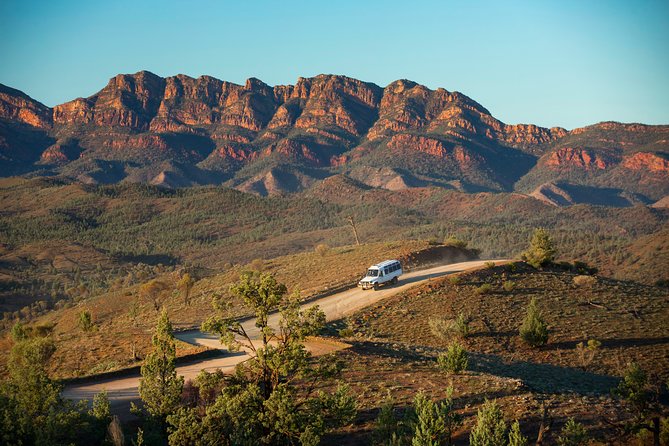A Parent’s Ultimate Guide to Exploring the Ikara-Flinders Ranges with Kids
Welcome, adventurous families! Are you ready to delve into the wonders of the Ikara-Flinders Ranges with your little explorers? Nestled in the rugged heart of South Australia, this natural playground offers an abundant array of activities that are perfect for curious minds and active bodies. Whether you’re planning a short getaway or a lengthy expedition, our guide will help ensure that your trip to this ancient landscape is not only safe but also brimming with learning opportunities and lasting memories.
Planning Your Trip to the Ikara-Flinders Ranges
Before you embark on your outback adventure, let’s talk planning. Visiting the Ikara-Flinders Ranges with kids requires some careful preparation to ensure that everyone has a fantastic time. Here are some essential tips to get you started:
- Choose the right time to visit: The best time to visit the Flinders Ranges is during the cooler months from April to October. Summers can be extremely hot, which might be challenging for young children.
- Accommodation: Whether you prefer camping under the stars or staying in a comfortable resort, there are options for every family. Book your stay well in advance, especially during school holidays and peak seasons.
- Travel arrangements: Depending on where you’re coming from, you’ll need to consider your mode of transport. The ranges are a 5-hour drive from Adelaide, so prepare for a road trip with plenty of snacks and entertainment for the kids.
Engaging Activities for the Whole Family
Now for the fun part – activities! The Ikara-Flinders Ranges are teeming with experiences that will captivate children of all ages. Here are some favorites:
- Hiking: With trails ranging from easy walks to challenging hikes, you can find the perfect path for your family’s fitness level. The famous Wilpena Pound offers several walk options with awe-inspiring views.
- Wildlife Spotting: The region is home to an incredible variety of wildlife, including kangaroos, emus, and the rare yellow-footed rock-wallaby. Bring along binoculars and a wildlife guidebook to enhance the experience.
- Fossil Exploration: Encourage your kids’ inner paleontologist by visiting sites rich in ancient fossils, teaching them about the Earth’s prehistoric past.
- Aboriginal Cultural Tours: Partake in guided tours that delve into the rich Aboriginal history of the land, allowing your family to learn about the traditional owners, the Adnyamathanha people.
Keeping Safe in the Great Outdoors
While fun is essential, safety is paramount. The Australian outback can be unpredictable, and it’s important to be prepared. Here’s how to ensure your family stays safe:
- Stay Hydrated: The dry climate means dehydration is a real risk. Carry ample water and encourage kids to drink regularly.
- Be Sun Smart: Sun protection is key. Always apply high SPF sunscreen, wear sun hats, and dress in protective clothing.
- Respect Wildlife: While wildlife encounters are exciting, it’s necessary to keep a safe distance and not feed the animals.
- Emergency Planning: Have a plan in place for emergencies. Make sure you have a first aid kit, inform someone of your travel plans, and be aware of your nearest medical facilities.
Educational Opportunities Abound
Every family trip can be an educational journey, and the Ikara-Flinders Ranges are no exception. From geology and ecology to history and culture, the learning opportunities are endless:
- Geology Rocks: The landscape is a geological wonderland. Use the rock formations to teach kids about the natural forces that shape our world.
- Eco Learning: Teach the kids about local flora and fauna and the importance of conservation efforts to protect these unique ecosystems.
- Stargazing: With clear skies and minimal light pollution, the Flinders Ranges offer a fantastic opportunity to teach your kids about astronomy and the night sky.
- History Lessons: The cultural history of the Adnyamathanha people and the European settlers provides valuable lessons about Australia’s past.
Concluding Thoughts
The Ikara-Flinders Ranges are a treasure trove of experiences waiting for your family to discover. Beyond just a holiday, this can be a transformative journey for your children – one filled with adventure, learning, and the joys of nature. With careful planning, a spirit of adventure, and a thirst for knowledge, your trip to the Ikara-Flinders Ranges will be an unforgettable chapter in your family’s story.
Ready to start planning your family adventure? Keep reading for insider tips on the best family-friendly hikes, where to spot the most fascinating wildlife, and how to pack your bags for success in the great Australian outback. Let the explorations begin!

5 Things Parents Should Know in Preparing for Ikara-Flinders Ranges
1. Educate Your Children Before the Trip
Before you set foot in the Ikara-Flinders Ranges, spend some time with your kids learning about the area. There’s a rich tapestry of Aboriginal culture, unique geology, and diverse wildlife to explore. Interactive books, documentaries, and online resources can make the learning fun and engaging. This pre-trip knowledge will enhance their understanding and appreciation of the experiences to come.
2. Pack Wisely for Outback Conditions
When packing for the Ikara-Flinders Ranges, you need to think practicality and safety. Essentials include:
- Sturdy walking shoes for everyone in the family.
- Lightweight and breathable clothing that offers sun protection.
- Layers for the cooler evenings and mornings.
- A comprehensive first aid kit, including any personal medications.
- Plenty of water bottles or hydration packs to refill along the way.
Remember, the weather out here can vary, so it’s best to prepare for all conditions.
3. Set Realistic Expectations
Understand that travelling with children means you may need to adjust your expectations. Plan for shorter hikes, allow for ample rest time, and be ready to adapt your itinerary. The goal is to make the experience enjoyable for the kids, which means not pushing them too hard and leaving space for spontaneous discovery and play.
4. Prioritize Connectivity and Navigation
While disconnecting is one of the joys of being in nature, having a way to communicate is crucial. Getting a satellite phone or ensuring you have a GPS device can be life-saving in remote areas. If you’re relying on your smartphone, download offline maps as connectivity can be unreliable.
5. Have Flexible Meal Arrangements
While the Ikara-Flinders Ranges have some dining options, they can be sparse and not always kid-friendly. Pack plenty of snacks and consider bringing cooking equipment if you’re staying in self-contained accommodation or camping. Familiar foods from home can comfort kids in new environments and keep their energy up throughout the adventures.
Tips for a Memorable and Safe Family Trek
Embarking on a family trip through the Ikara-Flinders Ranges is all about creating beautiful memories. It’s imperative, however, to keep certain tips in mind:
- Teach your children about the Leave No Trace principles to foster an appreciation of the natural environment.
- Participate in ranger-led activities available at certain times of the year, which can provide valuable information in an engaging manner.
- Use this adventure as an opportunity to build your children’s resilience and problem-solving skills. Facing and overcoming the small challenges that nature presents can be incredibly rewarding for them.
- Engage with local communities–it can add depth to your travel experience. You’ll often find that the local wisdom regarding hidden spots can be your best guide.
Ikara-Flinders Ranges offers a bounty of family-friendly fun. From exploring ancient landscapes to witnessing the stars like never before, the memories you create here will last a lifetime. Now that you’re equipped with all the tips and information, it’s time to lace up those hiking boots, pack your sense of adventure, and head out into the great Australian outback with your family! Happy exploring!
. For more information see here
Disclaimer
The articles available via our website provide general information only and we strongly urge readers to exercise caution and conduct their own thorough research and fact-checking. The information presented should not be taken as absolute truth, and, to the maximum extent permitted by law, we will not be held liable for any inaccuracies or errors in the content. It is essential for individuals to independently verify and validate the information before making any decisions or taking any actions based on the articles.




